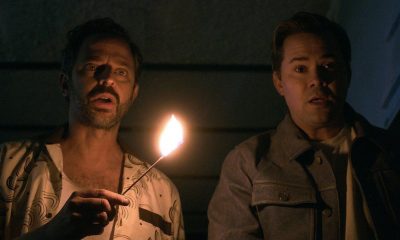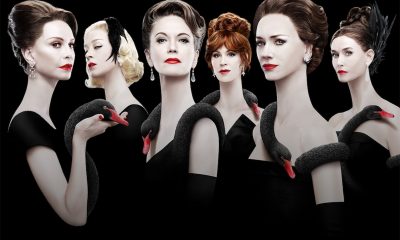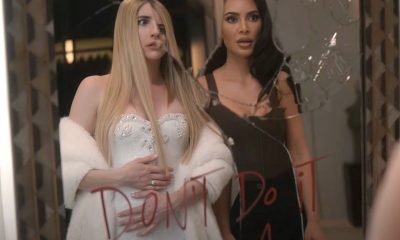Arts & Entertainment
Gay is ‘The New Normal’
Same-sex couple explores parenthood in new Ryan Murphy sitcom
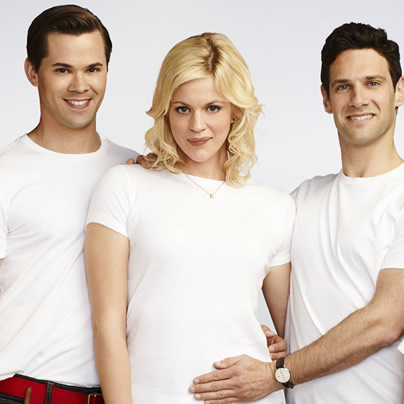
‘The New Normal’
NBC
Tuesdays at 9:30 p.m.
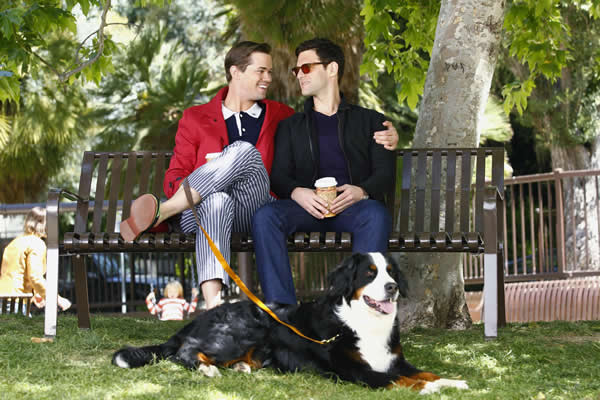
Andrew Rannells as Bryan (left) and Justin Bartha as David in the controversial new NBC comedy ‘The New Normal.’ (Photo courtesy NBC)
Now that “The New Normal” is off and running — an online pilot teased the series while its first two regular broadcasts were Monday and Tuesday this week before settling into its regular Tuesday night time slot — most TV fans know the premise.
This latest creation from gay TV mastermind Ryan Murphy (“Glee,” “Nip/Tuck,” “American Horror Story”), it tells of a happy young gay Los Angeles couple, Bryan (Andrew Rannells) and David (Justin Bartha), who convince new-in-town Goldie (Georgia King) to be a surrogate so they can start a family.
The show’s off to a decent-enough start. Monday night’s network debut found it winning its time slot drawing about 6.9 million viewers, though about 45 percent of those who’d tuned in for lead-in hit “The Voice,” cut out for “Normal.” Some critics are calling the performances a “triumph over content.”
Entertainment Weekly’s Ken Tucker calls Rannells — best known for his Broadway turn in “The Book of Mormon” — “one of the hottest young talents around and he does as much as he can with a role that co-creators Murphy and Ali Adler seem to have conceived as a cross between Charles Nelson Reilly and Rip Taylor; all Bryan is missing is a bag of confetti to throw at his costars after deliving a punchline. It’s to Rannells’ credit that he made the premiere’s attempts at heart tugging, wuch as a home video made for the future baby professing ‘how desperately you are wanted,’ seem heartfelt.”
The San Francisco Chronicle praised its “humor, solid performances” and “snappily written script.” The Los Angeles Times said the pilot “felt flat or programmatic … but much was likable as well, especially the nonchalant tenderness between the male leads.”
During a conference call last week, Rannells, Bartha and King fielded questions on everything from where the show is headed, to working with Murphy to what they think about the controversy the show has generated (Salt Lake City, Utah-based NBC affiliate KSL has refused to air the show though it claimed it was more for the “sexually explicit content, demeaning dialogue and inciting stereotypes” than its “gay characters or LGBT families; Two Utah pro-gay groups in a partnership with GLAAD are screening the show for Utah residents).
“I actually do hope people are offended by it,” Bartha says. “I think hopefully it will get conversations started in family homes and that families who love it will love it for what it is, a compassionate and loving family with many positive aspects. And the ones who are offended by it or find that it strikes them as offensive, hopefully they will maybe realize that they’re bigots and they’re ignorant and possibly our show can usher in a little more acceptance. I don’t expect it to change anyone’s life, but I do think one of the wonderful things about television is its ability to start a conversation, to inspire people to have those watercooler chats maybe the next day. It starts that discourse.”
King, a British actress with extensive film and TV credits, says realizing the show was drawing controversy was “the biggest thrill.”
“It’s bringing up topics and questions and ideas that maybe people haven’t had to consider before,” she says. “It’s a privilege to be doing something that’s starting a great conversation.”
But if the show takes off, where could it possibly go once the pregnancy storyline is played out? Some have questioned whether there’s enough meat to the setting to warrant a long-running series.
Rannells says all early signs are great as far as he’s concerned.
“We’re shooting the fifth episode so far and we’ve read six scripts so far and I have to say, the shows just keep getting better and better. If you’re asking what the second season, the third season and so on will look like, we don’t think of it that way. The main reason we all signed up was because of Ryan and Ali and I think when you see the rest of these episodes, you’ll see that it’s not only a great set up, but in the following episodes, it really does explore the depth of each character and make them each indelible.”
“Ryan’s just been extraordinary,” King says. “He’s got such a wonderful reputation for not being too kind of plucky and fake. He’s very to the point and personally, I absolutely love that. He’s so candid and so clear in his ideas in what he wants and I’m very happy to be there when he’s directing.”
And though he hasn’t said much about his personal life, Bartha admits playing gay with Rannells has been easy.
“From the first time I looked into Andrew’s eyes, I knew I could fall in love,” Bartha says. “I have such a respect for him as an actor and as a person that it was immediately apparent to me that this could work. I just thought he was a funny, good looking, talented guy and he’s easy to be around, so that was the basis of it. … I really wanted to play it as a real couple who love each other and have struggles just like everyone else. Ryan keeps reminding us of that all the time. He’s always saying, ‘Let’s keep this as real as possible.’ It’s funny, but it’s also very, very real. It’s not a sitcom in the classic sense.”
And while it’s ultimately meant to be light hearted and comical, the cast says they hope viewers will take away something deeper.
“What we’re ultimately saying is that what we’re creating is perhaps no different from your family,” Rannells says. “All families basically start as unlikely folks coming together to create this family. Initially it might seem like this is awfully different, but the story we’re telling is really universal.”

Team DC, the umbrella organization for LGBTQ-friendly sports teams and leagues in the D.C. area, held its annual Night of Champions Awards Gala on Saturday, April 20 at the Hilton National Mall. The organization gave out scholarships to area LGBTQ student athletes as well as awards to the Different Drummers, Kelly Laczko of Duplex Diner, Stacy Smith of the Edmund Burke School, Bryan Frank of Triout, JC Adams of DCG Basketball and the DC Gay Flag Football League.
(Washington Blade photos by Michael Key)




















The 2024 National Cannabis Festival was held at the Fields at RFK Stadium on April 19-20.
(Washington Blade photos by Michael Key)
















Covering the @NatlCannaFest at RFK Stadium for @WashBlade . Stop by the LGBTQ+ booth and pick up a paper if you are here. pic.twitter.com/is7hnsaPns
— Michael Patrick Key (@MichaelKeyWB) April 20, 2024
Theater
‘Amm(i)gone’ explores family, queerness, and faith
A ‘fully autobiographical’ work from out artist Adil Mansoor

‘Amm(i)gone’
Thorough May 12
Woolly Mammoth Theatre
641 D St., N.W.
$60-$70
Woollymammoth.net
“Fully and utterly autobiographical.” That’s how Adil Mansoor describes “Amm(i)gone,” his one-man work currently playing at Woolly Mammoth Theatre.
Both created and performed by out artist Mansoor, it’s his story about inviting his Pakistani mother to translate Sophocles’s Greek tragedy “Antigone” into Urdu. Throughout the journey, there’s an exploration of family, queerness, and faith,as well as references to teachings from the Quran, and audio conversations with his Muslim mother.
Mansoor, 38, grew up in the suburbs of Chicago and is now based in Pittsburgh where he’s a busy theater maker. He’s also the founding member of Pittsburgh’s Hatch Arts Collective and the former artistic director of Dreams of Hope, an LGBTQ youth arts organization.
WASHINGTON BLADE: What spurred you to create “Amm(i)gone”?
ADIL MANSOOR: I was reading a translation of “Antigone” a few years back and found myself emotionally overwhelmed. A Theban princess buries her brother knowing it will cost her, her own life. It’s about a person for whom all aspirations are in the afterlife. And what does that do to the living when all of your hopes and dreams have to be reserved for the afterlife?
I found grant funding to pay my mom to do the translation. I wanted to engage in learning. I wanted to share theater but especially this ancient tragedy. My mother appreciated the characters were struggling between loving one another and their beliefs.
BLADE: Are you more director than actor?
MANSOOR: I’m primarily a director with an MFA in directing from Carnegie Mellon. I wrote, directed, and performed in this show, and had been working on it for four years. I’ve done different versions including Zoom. Woolly’s is a new production with the same team who’ve been involved since the beginning.
I love solo performance. I’ve produced and now teach solo performance and believe in its power. And I definitely lean toward “performance” and I haven’t “acted” since I was in college. I feel good on stage. I was a tour guide and do a lot of public speaking. I enjoy the attention.
BLADE: Describe your mom.
MANSOOR: My mom is a wonderfully devout Muslim, single mother, social worker who discovered my queerness on Google. And she prays for me.
She and I are similar, the way we look at things, the way we laugh. But different too. And those are among the questions I ask in this show. Our relationship is both beautiful and complicated.
BLADE: So, you weren’t exactly hiding your sexuality?
MANSOOR: In my mid-20s, I took time to talk with friends about our being queer with relation to our careers. My sexuality is essential to the work. As the artistic director at Dreams of Hope, part of the work was to model what it means to be public. If I’m in a room with queer and trans teenagers, part of what I’m doing is modeling queer adulthood. The way they see me in the world is part of what I’m putting out there. And I want that to be expansive and full.
So much of my work involves fundraising and being a face in schools. Being out is about making safe space for queer young folks.
BLADE: Have you encountered much Islamophobia?
MANSOOR: When 9/11 happened, I was a sophomore in high school, so yes. I faced a lot then and now. I’ve been egged on the street in the last four months. I see it in the classroom. It shows up in all sorts of ways.
BLADE: What prompted you to lead your creative life in Pittsburgh?
MANSOOR: I’ve been here for 14 years. I breathe with ease in Pittsburgh. The hills and the valleys and the rust of the city do something to me. It’s beautiful, it’ affordable, and there is support for local artists. There’s a lot of opportunity.
Still, the plan was to move to New York in September of 2020 but that was cancelled. Then the pandemic showed me that I could live in Pittsburgh and still have a nationally viable career.
BLADE: What are you trying to achieve with “Amm(i)gone”?
MANSOOR: What I’m sharing in the show is so very specific but I hear people from other backgrounds say I totally see my mom in that. My partner is Catholic and we share so much in relation to this.
I hope the work is embracing the fullness of queerness and how means so many things. And I hope the show makes audiences want to call their parents or squeeze their partners.

